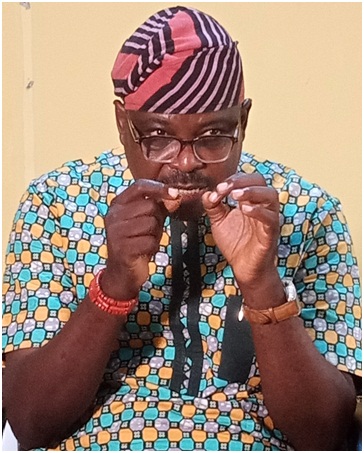Ondo Public Service Training Institute ’ll be first in AI capacity building – DG
- The Hope Newspaper / 2 weeks
- 9 March 2025

Dr Olumide Asere is the Director-General (DG) of the Ondo State Public Service Training Institute (PSTI), Ilara-Mokin in the Ifedore Local Government area of Ondo State. In this interview with The Hope, he brought to light the lofty programmes of the Institute, geared towards propelling the public service to be AI compliant. He also highlighted its impacts on the State’s public service.
Excerpts:
Can we meet you?
My name is Dr Olumide Olusesan Asere from Ipogun in Ifedore local government area of Ondo State. I am a product of Lagos State University where I obtained my first and second degrees. After joining the civil service of Ondo State in 2001, I went to Obafemi Awolowo University (OAU), Ile – Ife, to acquire a second master’s degree and a doctorate in Public Administration. Before coming to Ondo State, I taught in some institutions, mostly at their satellite campuses located in Lagos State before the emergence of the National Open University of Nigeria, (NOUN).Teaching and managing people in the civil service is a chosen course and God has been helping me. Today, I am proud to be a Permanent Secretary in Ondo State because of the grace extended to me by Mr. Governor, Dr Lucky Orimisan Aiyedatiwa, and I am proud to say that so far the journey has been very good.

Since the commissioning of the institute in 2017, what are the institute’s programmes?
As a training institute, we have been able to expand our horizons in different spheres. The focus of the institute is to develop skills in manpower training and to enhance the capacity of civil servants in their various offices, so that we can have a better public service, and today we have seen the benefits of the establishment of the institute. I want to add that the institute started in 2017 when it became officially pronounced as a training institute and it was commissioned by the then Governor, Dr Olusegun Mimiko, and the intention then was to rejuvenate capacity building in Ondo State civil service. Before this time, the state depended largely on trainings of its work- force outside the state. A lot of resources were expended on trainings that could have been conducted by the state government. Therefore, it became imperative that the state should have its training institute, just like we have ASCON and CMD owned by the Federal Government.

Talking about our progarmmes, they cut across all levels. Before 2017, the PSTI was called Training School which was domiciled in Alagbaka. However, with the increasing desire to have a robust training programmes for public servants, it was decided that a new training institute should come to reality, and in the process, Diploma courses in Accounting, Business Administration, Sport Administration, and Office Management; programmes of the institute were expanded. All of these are some of the programmes for the secretarial cadre.
Later, new programmes came on stream, and today the executive management course for education managers and public sector managers has become the hallmarks of our contributions towards on-the-job training in Ondo State. We believe that our teachers need to be more productive. That was why the executive management course for education managers was established. Likewise, it was felt that the public sector requires more precise training which we also call position training. Therefore, the executive management course for public sector managers was also established. Today, we have trained over 4,000 people. So the institute has become a veritable forum for training all categories of civil servants. It has become the norm that if you want to proceed in your career, especially at the management level, you must possess a diploma from the institute.

You said you have trained over 4,000 people. Can you tell us some of the impacts?
Sometimes when we talk about training, it’s not tangible but it can be observed from performance. We have seen a significant change in civil servants’ attitudes toward their work. For instance, most capacity trainings have enhanced people’s knowledge about the civil service, regulations, and laws. It has also equipped them to perform better in their various fields. Today, we are training all kinds of civil servants from various fields, because management of people and resources is a critical element in the public service which cannot be pushed aside.
Related News Why women take longer time to dress up
In Financial Management and Human Resources, we have found out that our people are excelling. We are getting feedbacks from people who have commented about performance improvement in their offices. We are getting feedbacks from the teachers in terms of class management and improved cognitive skills of the students, and even passing of WAEC exams by the students.

Do you have any foreign collaborators or affiliations?
We are working on foreign collaboration, but for now we have affiliations with other institutions such as AAUA, Akungba . We run PGD in Management and Strategic Studies), and OAUSTECH for training and manpower development of lecturers and some other university workers. A lot is being done in the area of affiliation and we are also working with other private institutions like Hollaram to bring about new courses that will help Ondo State civil servants and even the private sector to grow.
Most of your students are Master’s Degrees and PhD holders. What form of training do you offer them?
I want to first of all commend Governor Lucky Aiyedatiwa because of the new inspiration that he has brought into the civil service. When you look at the Governor, he is very passionate about performance and efficiency in the civil service. He also understands that for civil servants to perform, and to enhance their competency, they must be able to acquire new knowledge. Knowledge is not just about academic qualifications. The public service is so essential to the development of the state that issues of on-the-job training cannot be pushed aside. No matter the academic qualifications of an officer, he is still expected to develop further, and this self-development approach is a window where civil servants are trained on the nuances of what it takes to serve the people. You must also understand that certain things are not taught in the universities. After acquiring general knowledge from the university, you need on-the-job training, and it is intended to improve efficiency in your area of specialization. It’s not about qualification but improving your skills.

Since you became DG, what are the challenges you have faced, and how did you deal with them?
One cannot have an organization as large as this and there will be no challenges, but I must commend our Governor for the passion he has for this institute. Shortly after emerging as Governor, the institute was one of the first places he visited, just to show us that he believes so much in capacity building. Then, he promised to provide additional infrastructure, such as new hostel buildings, and that is in our 2025 budget. Hopefully, we will access that fund so that we can move forward. He has supported us tremendously because he believes that all organizations require capacity building, which can come either as self-sponsored or state-sponsored. Today, we are getting the best of support from Mr. Governor and that is why our programmes have been very effective. Also, the Head of Service, Mr. Bayo Philips, has been very supportive. Whenever we reach out to him on any issue, he addresses it very promptly. In terms of challenges, one of them is resistance from public servants who feel that they should not be part of this programme; but we have educated them that this programme is different from their regular educational pursuits and that this is on-the-job training. Secondly, regarding the issue of hostel accommodation, the governor has already settled that, and we are hoping that before the end of this year, it would have been resolved completely. These are the critical areas. Others we have been able to resolve in our own way.
Related News Liverpool Varsity alumni honour Gov Aiyedatiwa
Do you have centres spread across the state and how are they faring?
We recognize that our public servants are spread across the state, most especially the teachers and even other cadres. We now realize that to get to the nooks and crannies of the state, we must establish centres in all those places. We have about nine centres across the state and we are still planning for more. We want to reduce the risk and stress of travelling to Akure. We have centres in Okitipupa, Ondo, two in Akure, we have in Owo, Ikare, and Oka Akoko.

You talked about some achievements that you have made?
We have made significant achievements in the area of training and capacity building. The Executive Management programme began before I came in as the DG. It was started by my predecessor. However, capacity is an evolving process. We have had to build on what we met on the ground. One of them is creating new centres to enhance access to knowledge. We have also been able to develop new curricula. For instance, there is a new Executive Management curriculum we have just developed which deviates significantly from what we had before. We have been able to reduce a six-month course to three months, with one month for practicum, and that has enhanced people’s capacity to a large extent because we don’t want people to be engrossed with too many academic activities. Because of that, people now embrace the programme more. Since I came, we have achieved a lot of milestones, such as the creation of a digital education programme. We discovered that the world is now a more technology-driven system. The public service of Ondo State cannot be excused from investing in technology. Right now, there is a technology race, especially in Artificial lntelligence, because Artificial Intelligence rules the world. Our institute is the first to embrace AI in Ondo State. Right now, we have trained over 1,000 teachers in Artificial Intelligence. We have gone around the state to spread that knowledge. In terms of technology adoption, the governor came to launch the e-learning project of the institute. That is evolving but we have started and have been able to train over 100 youths in that area. It is a form of community relations programme. We went around all the communities in Ifedore as a pilot programme to create awareness about the institute and train their children. We discovered that one of the greatest problems we have is youth unemployment. The youths engagement programme led to the training of over 100 youths in various skills through e-learning. We have also established an e-library facility. All the former heads of Service have been here to visit the facility.

You talked more about the public servants. What about the private sector and students?
We have made significant inroads. When I came in, we developed our brochure and one of the things we did was to sensitize everybody about it. We went round all the states in the southwest. Today, all our brochures have been distributed to the southwest states and Edo. We wanted the Heads of Service of those states to find a way of bringing their people here. We also established a website that could convey the message of the Institute to every part of the world, and we have been getting positive feedbacks from that because some states called and demanded to get our brochure not quite long ago. The Institute is getting recognition outside Ondo State. There is no doubt about that. On the issue of private organizations, this place has been a centre of training for bankers for some time, and we are doing a lot to attract private institutions to partner with us. That is why today, we have a partnership with Hollaram Educational Institute. Very soon we are going to start new programmes that will enhance capacity. The AI training programme we are doing is not meant for public servants alone. A lot of private schools have registered for it. We are operating a business strategy, not like the average civil service because we generate IGR for Ondo State. We must see how we can continue to tap into resources outside the public service because we know that the government has limited resources. We are achieving success in that area, and I believe shortly, a lot more will be achieved.
Related News Wearing bra brings bad market for us-Ladies
Concerning AI, have there been encouraging responses from civil servants?
Right now, we are on the verge of starting a programme for Permanent Secretaries because we believe that for the artificial intelligence programme to be successful, we need to get the buy-in of the most senior people in the civil service, and the Permanent Secretaries are at the top. We are starting the training programme on Artificial Intelligence for civil servants with the permanent secretaries, and that will come up very soon. We have established all the synergy, and all we just need to do is to bring them here in the next one or two weeks. It’s going to be a one-day training but it will be very rich. From there, we can now move to other cadres because AI is the key all over the world. Right now there is serious competition among advanced nations on that. Even Nigeria is not left behind. Ondo State cannot afford to watch while the world is moving. I want Ondo State Public Service to be the first in Nigeria to build capacity in Artificial Intelligence. We are also going to establish an internship center where university students of ICT and Computer Engineering can do their SIWES programme. We have set up all the infrastructure to make it work. We are being futuristic, looking at Ondo State establishing its presence in AI in the next couple of years.

Apart from AI, what other legacy do you want to be known for?
The legacy I hope to leave is building a sustainable institution. There is a quote from Jean Monnet which says: “Nothing is possible without men, but nothing lasts without institutions.” When opportunities come to head an organisation, you must leave a lasting imprint of your presence, so that generations to come can begin to build on that. Most of the activities embarked on in the last three years are intended to improve our institution’s capacity. We want a better public service dedicated to humanity in terms of service delivery, performance, and productivity, and this Institute has been doing everything possible to get the buy-in of both the political and administrative classes so that we can have a better public service. Now, the standard we are setting here is international because the institute itself was built based on an international standard. By the grace of God, more investments will come for us to be able to compete with any organization from any other part of the world. I must also say that some of our training programmes have become something for other organizations to emulate because we have a unique system. This Executive Management programme for public service is unique to Ondo State, and today other states are also looking for it. The facilities we have here are the envy of outsiders. We are connected to the national grid and get about 20 hours of electricity per day. For a training institution, you can’t do without electricity. If you want to depend on a generator, the institute will collapse. We have been able to build a power system that can last for 20 to 22 hours in a day.


